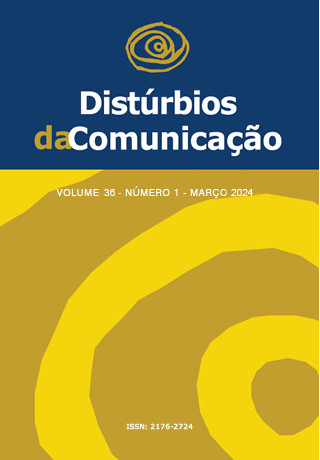Dysphagia in Autism Spectrum Disorder (ASD)
An integrative review
DOI:
https://doi.org/10.23925/2176-2724.2024v36i1e65311Keywords:
Autism Spectrum Disorder, Deglutition, Deglutition disorder, DysphagiaAbstract
Introduction: Autism Spectrum Disorder (ASD) is a neurodevelopmental disorder characterized by deficits in social communication, changes in sensitivity and eating difficulties. Objective: To carry out an integrative review of swallowing changes in individuals with ASD. Methods: The research was carried out through a search for national and international articles, using descriptors for the research, as well as inclusion and exclusion criteria for selecting the final sample. The PPOT strategy was used to define eligibility criteria, including population (children and adults), predictor (ASD diagnosis), outcome (report or diagnosis of dysphagia oral, pharyngeal or esophageal), and study type (observatory studies). The search was carried out from June to August 2023, in the databases: Pubmed, Scopus, Embase and Google Scholar. Results: Ten studies were selected with patients diagnosed with ASD who reported symptoms of oropharyngeal and esophageal dysphagia, in addition to complaints about food intake. Studies suggest that children with ASD may present problems with oral motor dysfunction, inadequate eating frequency, obsessive eating patterns, specific presentation of certain foods, food selectivity and sensory processing difficulties. Conclusion: It is concluded that there is no robust scientific evidence about the presence of dysphagia in patients with ASD.
Downloads
References
Camargo SPH, Rispoli M. Análise do comportamento aplicada como intervenção para o autismo: definição, características e pressupostos filosóficos. Rev. Educ. Esp. 2013; 29(1):127-44. https://doi.org/10.5902/1984686X9694.
Bottan GP, Duartw CN, dos Santos Santana JR, Mendes RDCD, Schmitz WO. Analisar a alimentação de autistas por meio de revisão de literatura. Braz. J. Dev. 2020; 6(12):100448-70. https://doi.org/10.34117/bjdv6n12-512.
Levy DS, Almeida ST. Disfagia infantil. 1st ed. Rio de Janeiro, RJ: Thieme Revinter Publicações LTDA; 2018.
Oliveira PL, Souza APR. Terapia com base em integração sensorial em um caso de Transtorno do Espectro Autista com seletividade alimentar. Cad. Bras. Ter. Ocup. 2022; 30(1):184-92. https://doi.org/10.1590/2526-8910.ctoRE21372824.
Rinaldi A. Piecing together a different picture: A host of new studies on autism have begun decoding the longstanding puzzle of its causes. EMBO Rep. 2016; 17(7): 938-40. https://doi.org/10.15252/embr.201643502.
Williams PG, Dalrymple N, Neal J. Eating habits of children with autism. Pediatr. Nurs. 2000; 26(3): 259-64.
Malagelada J, Bazzoli F, Boeckxstaens G, De Looze D, Fried M, Eua PK, et al. Diretrizes globais da organização mundial de gastroenterologia: disfagia - diretrizes globais e atualização em cascata. J. Clin. Gastroenterol. 2015; 49(4): 285-92. https://doi.org/10.1097/mcg.0000000000000307.
Betalli P, Carretto E, Cananzi M, Zanatta L, Salvador R, GaleazziF, et al. Autism and esophageal achalasia in childhood: a possible correlation? Report on three cases. Dis. Esophagus. 2013; 26(6): 621-4. https://doi.org/10.1111/j.1442-2050.2012.01358.x.
Souza MT, Silva MD, Carvalho R. Revisão integrativa: o que é e como fazer. Einstein (São Paulo). 2010; 8(1 Pt 1): 102-6. http://dx.doi.org/10.1590/s1679-45082010rw1134.
Barnhill K, Tami A, Schutte C, Hewitson L, Olive ML. Targeted Nutritional and Behavioral Feeding Intervention for a Child with Autism Spectrum Disorder. Case Rep. Psychiatry. 2016; 2016:1-7. https://doi.org/10.1155/2016/1420549.
Chaidez V, Hansen RL, Hertz-Picciotto I. Gastrointestinal problems in children with autism, developmental delays or typical development. J Autism Dev Disord. 2014; 44(5): 1117-27. https://doi.org/10.1007/s10803-013-1973-x.
Kamionkowski S, Shibli F, Ganocy S, Fass RL. The relationship between gastroesophageal reflux disease and autism spectrum disorder in adult patients in the United States. Neurogastroenterol Motil. 2021; 33(8): e14295. https://doi.org/10.1111/nmo.14295.
Levin DS, Volkert VM, Piazza CC. A multi-component treatment to reduce packing in children with feeding and autism spectrum disorders. Behav. Modif. 2014; 38(6): 826-40. https://psycnet.apa.org/doi/10.1177/0145445514550683.
Restrepo B, Angkustsiri K, Taylor SL, Rogers SJ, Cabral J, Heath B, et al. Developmental-behavioral profiles in children with autism spectrum disorder and co-occurring gastrointestinal symptoms. Autism Res. 2020; 13(1): 128-42. https://doi.org/10.1002/aur.2354.
Ahmed E, Mansour A, Amer A, Barakat T, Baz. Screening of gastrointestinal symptoms and celiac disease in children with autism spectrum disorder. Egypt J Otolaryngol. 2022; 38(1): 1-8. https://doi.org/10.1186/s43163-022-00270-6.
Magagnin T, Da Silva MA, De Souza Nunes RZ, Ferraz F, Soratto. Food and nutritional aspects of children and adolescents with autism spectrum disorder. Physis. 2021; 31(1): 1-21. https://doi.org/10.1590/S0103-73312021310104.
Nygren G, Linnsand P, Hermansson J, Dinkler L, Johansson M, Gillberg C. Feeding Problems Including Avoidant Restrictive Food Intake Disorder in Young Children with Autism Spectrum Disorder in a Multiethnic Population. Front. Pediatr. 2019; 7: 1-12. https://doi.org/10.3389/fped.2021.780680.
Şahan AK, Öztürk N, Demir N, Karaduman AA, Serel Arslan S. A comparative analysis of chewing function and feeding behaviors in children with autism. Dysphagia. 2021; 36(3): 481-9. https://doi.org/10.1007/s00455-020-10228-6.
Viviers M, Jongh M, Dickonson L, Malan R, Pike T. Parent-reported feeding and swallowing difficulties of children with Autism Spectrum Disorders (aged 3 to 5 years) compared to typically developing peers: a South African study. Afr. Health Sci. 2020; 20(1): 59-68. https://doi.org/10.4314/ahs.v20i1.59.
Castro K, Perry IS, Ferreira GP, Marchezan J, Becker M, Riesgo R. Validation of the Brief Autism Mealtime Behavior Inventory (BAMBI) Questionnaire. J. Autism Dev. Disord. 2019; 49(7): 2983-2990. https://doi.org/10.1007/s10803-019-04006-z.
Serel AS, Aydin G, Alemdaroglu İ, Tunca Yilmaz Ö, Karaduman AA. Reliability and validity of the Karaduman Chewing Performance Scale in pediatric neuromuscular diseases: A system for classification of chewing disorders. J. Oral Rehabil. 2018; 45(12): 920-925. https://doi.org/10.1111/joor.12642.
Downloads
Published
Issue
Section
License
Copyright (c) 2024 Brenda Carla Lima Araújo, Keila Suyane de Jesus Felix, Kawanny Oliveira Marques da Silva, Rosana Carla do Nascimento Givigi, Susana de Carvalho

This work is licensed under a Creative Commons Attribution 4.0 International License.









